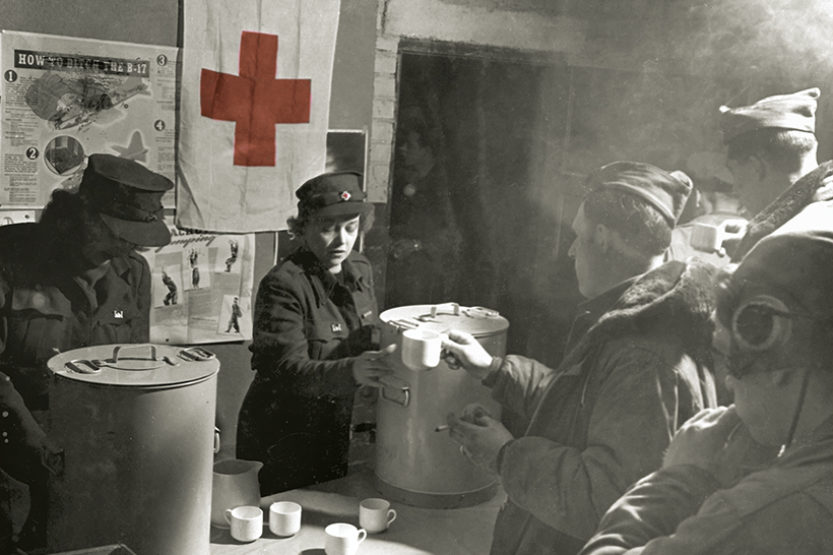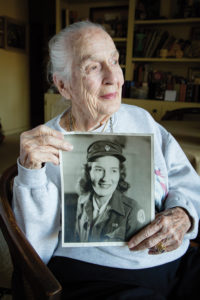Behind Enemy Lines
 As a Red Cross Clubmobile operator, Knappenberger was initially stationed at Glatton Airfield in England where she and her unit provided B-17 bomber crews with doughnuts and coffee.
As a Red Cross Clubmobile operator, Knappenberger was initially stationed at Glatton Airfield in England where she and her unit provided B-17 bomber crews with doughnuts and coffee. Jill Pitts Knappenberger, ’50 ACES, a native of Bloomington, Ill., was born in Evanston, Ill., in 1918. She attended Stephens Junior College for Women in Columbia, Mo., before enrolling at the University of Illinois in 1939 after winning a scholarship. In 1943, she volunteered for the American Red Cross and became one of more than 1,000 young American women who served on Clubmobiles—converted buses and trucks that provided coffee, doughnuts and morale-boosting cheer to Allied troops in Europe. Her Clubmobile was the only one caught in the Battle of the Bulge. Postwar, Knappenberger returned to UI to complete her degree and then joined the University’s Extension staff. In 1953, she married Gaillard Knappenberger, a Champaign attorney (he died in 1988). Jill is an accomplished painter and played golf until her 80s. An enthusiastic traveler, she has visited 98 countries. For many years, Knappenberger served on local and University-related boards, including those of the Spurlock Museum and Krannert Art Museum.
The Christian name on my birth certificate is Margaret Frances, but I’ve never used it.
When my mother was pregnant, she left Bloomington to visit her parents in Chicago. In those days, pregnant women stayed at home, and physicians didn’t do sonograms. My mother thought this swelling she had was part of being pregnant, but her mother recognized it right away as uremic poisoning. Her parents dashed her off to Evanston Hospital to induce labor. The doctor delivered a boy, Jack, before midnight; then he discovered there was going to be another baby. So dad wired back to his parents in Bloomington, “Jack arrived at such-and-such a time, and Jill came tumbling after.” That’s how I got the name I’ve always gone by.

“I didn’t want to be a WAAC or a WAVE because I wanted to go overseas, so I joined the Red Cross,” Jill Pitts Knappenberger says. Photo by L. Brian Stauffer
My family moved to Bloomington in 1932. It was during the Great Depression. We had a big family—mother had six children in seven years, think of that!—and it was more economical for us to live on a farm with our own garden and cows. I studied home economics when I came to the University of Illinois, which was the subject my mother had studied.
For recreation, we danced! We went to a lot of dances—fraternity dances, house dances. We danced and we drank and we went to football games. We used to go to the restaurant Prehn’s, and then to Bradley’s Ballroom. We had Coke dates and went to Kam’s for booze.
It was a different life then. Everybody had to live in the sorority house, and you had to be in by 10:30, maybe 11 or 12, on Saturday nights. Nobody had a car. You had to have written permission to ride in a car. My two brothers were in the military; all the young people were 100 percent behind the American forces to get rid of Hitler and the Japanese who bombed Pearl Harbor. I didn’t want to be a WAAC or a WAVE because I wanted to go overseas, so I joined the Red Cross. I wanted to be a Clubmobile operator.
We were to ship out before Christmas in 1943, but the Germans heard about our convoy leaving New York City, so we got delayed.
Our convoy zigzagged across the Atlantic; it was the largest convoy that had ever left the States. You could look out on deck, and there were ships as far as you could see—battleships, aircraft carriers and a lot of luxury ships like ours that had been converted to troop carriers. It took 10 days for us to get to Scotland. I got my permanent assignment at Glatton Airfield, the largest B-17 bomber base in England.
Our unit would travel in these Green Line buses, which were equipped with doughnut machines and coffee makers. We knew the military was preparing for the D-Day invasion, and we volunteered for that mission. We couldn’t take the Green Line buses to the continent because they only had six inches of ground clearance. Consequently, we traveled to London to take a course on how to drive two-and-a-half-ton, GMC army trucks. We learned how to double clutch, do maintenance, change 55-pound tires. Of the 1,000 people who took the course, only two got a superior rating, and I was one.
In May 1944, the Germans started sending over the V1 and V2 rockets—the “buzz bombs.” So long as you could hear them, you were alright. But when their engines shut off, they dropped immediately—and they were very deadly. I managed to lose 10 pounds in that time because of nervous tension.
Our unit landed on Utah Beach during the last week of July. We were attached to the Eighth Corps, Third Army, and moved with them through Normandy and Brittany. I didn’t feel I was really in danger until Dec. 16—then we knew we had a problem. That was the first day of the Battle of the Bulge. One of my brothers was killed that day by an 88-mm German shell. One of the hardest things I had to cope with was when they told me I couldn’t write or inform my folks about what had happened.
We were cut off and surrounded. The weather was very cold, 10 to 20 degrees below zero; there were high winds and heavy snow. Everyone had frozen hands, faces or feet. Finally, the 101st Airborne came in and escorted us out.
We were driving along with a Jeep carrying a colonel, a lieutenant colonel and a captain. It was dark and they crashed into the back of an Army truck hauling ammunition, so we transported them in our Clubmobile. Of course, I did all the driving. I could do it and liked it. We zigzagged randomly out of Germany. Eventually, we found our group in Charleville, France.
After the war, I lived in Chicago and New York City for awhile. I returned to UI in ’49. I lived in Lincoln Avenue Residence Hall, the first year it opened. I felt like an old lady because I was 10 years older than everyone else. But I wore sweaters, skirts and saddle shoes just like them.
After I graduated, I joined the Extension staff in Henry, Ill. When I married my husband Gai, I moved to Champaign. He was an attorney and a member in the Elks, which was a prominent part of our social life. I still belong to the Champaign Country Club, and I go there Fridays to play mahjong. I’m active in the Episcopalian Church and its Easter egg hunts, which are its main money-making project. I think we decorate more than 3,700 eggs each year!
Since 1940, I’ve given 10 gallons of my rare O-negative/CMV negative blood, which 99 percent of people don’t have. It’s the only kind of blood preemie babies can take.
I’m glad I’m in Champaign; I plan to stay here for the rest of my days, which I hope aren’t too many. Everybody asks me, “Do you hope to reach 100?” I answer, “Not particularly.” My birthday is Patriot’s Day, and I plan to have a drink. A Manhattan on the rocks. I call it joy juice!
Editor’s note: This interview has been condensed and edited.

